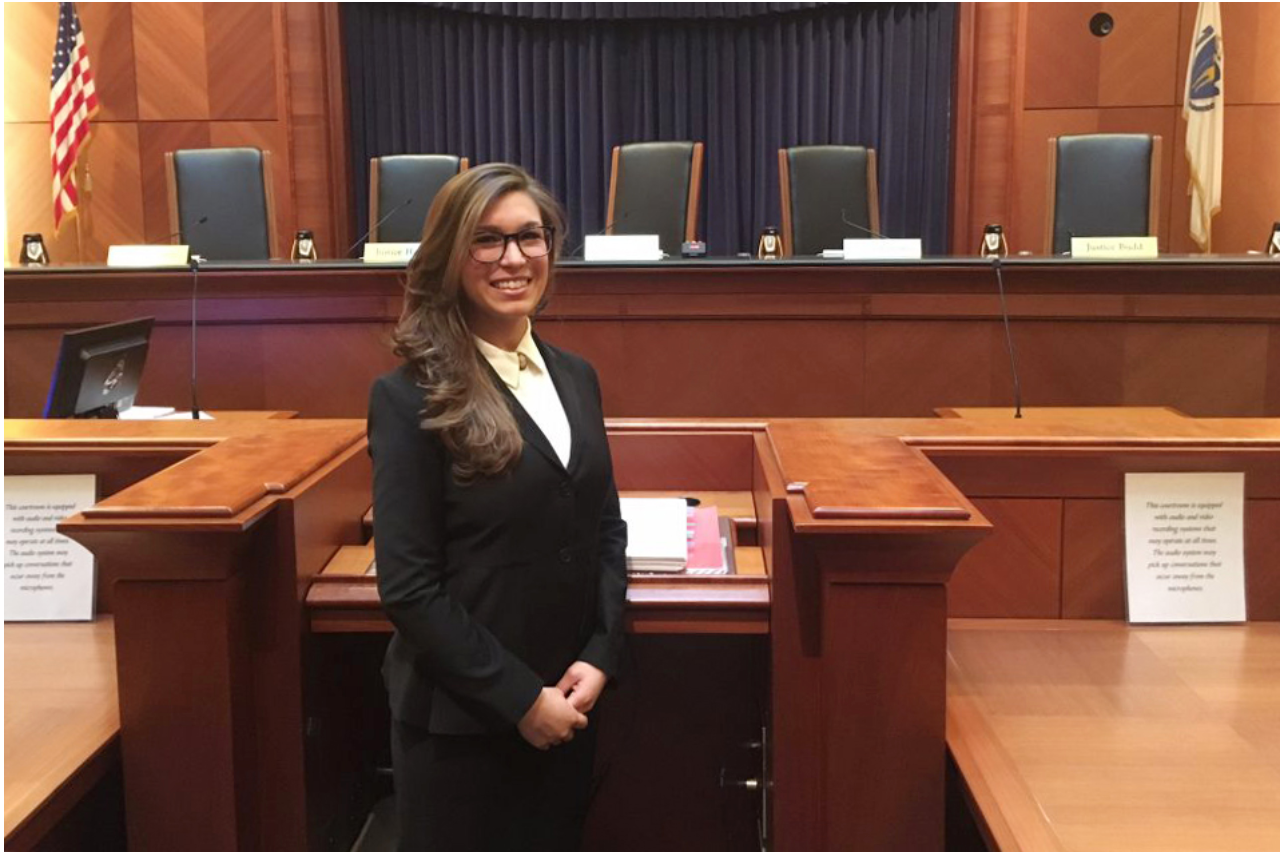
Credit: Jean Gill via iStock/Getty Images
Michael Horrell ’14 became the first of many Harvard Law School students to represent Richard Crowell when he appeared on his client’s behalf at a parole hearing in 2012. Horrell, who was working as a member of the Harvard Prison Legal Assistance Project (PLAP), would ultimately be the first link in a chain that would lead to Crowell’s freedom.
Crowell, 76, suffers from chronic cognitive disability due to a severe traumatic brain injury. As a teenager in 1962, Crowell had been recruited by several older men to drive a getaway car in a convenience store robbery. After one of those men shot and killed the storekeeper, Crowell pled guilty to second degree murder to avoid the death penalty, which was still in force in Massachusetts at the time. After being paroled in 1975, he was attacked and suffered a brain injury in 1987, after which he was returned to prison, where he has remained since 1990.
Despite the board indicating awareness that Crowell’s condition would not improve, he was denied parole on the grounds that there were no existing means outside of prison suitable for supporting Crowell and his disability. PLAP sued the board, claiming discrimination.
Parole cases have long been central to PLAP’s work in representing those incarcerated in Massachusetts prisons. In most cases, two PLAP students represent a prisoner with a life sentence in a single parole hearing.
Thanks to years of administrative and courtroom advocacy by a series of PLAP students, Crowell was recently released on parole. Over the course of several years, succeeding generations of PLAP students pushed the litigation forward—including Tucker DeVoe ’15, Erin DeGrand ’16, Ethan Stevenson ’17, Keke Wu ’18, Beini Chen ’18—and the case ultimately came before the state’s Supreme Judicial Court, where it was argued by Tabitha Cohen ’18.
The SJC’s 2017 ruling in Crowell’s favor set groundbreaking precedent concerning the Parole Board’s responsibility, under the Americans with Disabilities Act, to accommodate individuals with a mental disability in the parole process. That was not the end of the case, though. A 2018 rehearing before the Parole Board and follow-up advocacy—handled by PLAP Senior Clinical Instructor John Fitzpatrick ’87, Asseret Frausto ’19, Regina Powers ’19, Sheridan Cunningham ’20, and co-counsel from the local public defender agency—produced a lengthy wait, until Crowell was approved for parole to a specialized nursing facility in July 2020. In a notable departure from previous practice, the Board itself located and secured the residential placement.

PLAP Court Victory Helps Disabled Parolees: In May 2017, the Massachusetts Supreme Judicial Court extended the American with Disabilities Act to mentally and physically disabled prisoners seeking parole, ruling that the state must help them get support systems in place in the community—thanks to years of work by students with Harvard’s Prison Legal Assistance Project. Tabitha Cohen ’18, above, argued the appeal on behalf of prisoner and brain injury survivor Richard Crowell.
Crowell is among many clients with mental health challenges that PLAP’s students have helped in recent years. When PLAP took his case in 2013, Wilfred Dacier had already been awaiting release on parole for years. In 2010, after serving 15 years in prison during which he was diagnosed with and treated for schizoaffective disorder, and had an unblemished prison record, Dacier had been approved for parole, but only on the condition that the Massachusetts Department of Mental Health (DMH) admit him to an inpatient facility. DMH declined to do so, finding that hospitalization was not warranted, and the board in turn withdrew its decision approving parole.
Fan Li ’15 and Julianne Hill ’15 represented him in the hearing that followed, and Ariel Simms ’16, Erik Mortensen ’18, and Justin Kenney ’19 continued the work on his behalf through follow-up negotiations and another parole hearing in 2017. Parole was denied each time, with the board unwilling to consider any release plan other than DMH hospitalization.
PLAP took the 2017 parole denial to Superior Court, which reversed the Board’s decision in light of the SJC’s Crowell opinion and the fact that Dacier was unfairly being asked to do something – obtain admission to a DMH facility – that he had no ability to do. Dacier’s case was returned to the Parole Board for a rehearing in January 2020, at which he was represented by Blair Ganson ’20 and Hadhy Ayaz ’21. After months of waiting, Dacier was notified in June 2020 of his release to a skilled nursing facility—as with Crowell, a placement secured by the Parole Board itself.
They’ve been granted parole. So why can it take years for them to get out of prison?
The Department of Corrections sometimes doesn’t release prisoners until long after they’re approved for parole. Many then are sent back for minor missteps.
Nearly 10 years ago, Wilfred Dacier was told he would be a free man. But for Dacier, now 63, his view continued to be a little corner of the town of Gardner that changed only with the seasons. …That Dacier remained in prison at all after being granted parole, let alone for most of a decade, is “crazy,” says Joel Thompson, a managing attorney at the Harvard Prison Legal Assistance Project at Harvard Law School, who represents Dacier. “In 2010 you paroled him, and the only thing he has messed up since then is failing to get DMH to take him. Why aren’t we just hashing out a release plan together?”
Bigger Prisons Creating Bigger Challenges
That these two clients had significant mental disabilities was no outlier but the continuation of a trend. According to Fitzpatrick, the student practice organization has been handling parole hearings since at least 1984, when he first worked in PLAP as a student, but the work changed as mass incarceration took root in Massachusetts and nationally. Fitzpatrick returned to PLAP in 1997 as a supervising attorney, and since then he has witnessed how massive policy shifts beginning in the late 1980s, “favoring aggressively arresting, prosecuting and incarcerating more people,” have produced a prison population today in which mental and medical disabilities are highly prevalent.
Not surprisingly, many such prisoners have difficulty getting by in the unyielding and punitive environment of a prison, and PLAP represented a growing number of clients with disabilities in prison disciplinary hearings. Fitzpatrick noted that the “large disabled prisoner population, sentenced to lengthy or life sentences, suffering from a multitude of mental health, cognitive and physical disabilities that only worsen in prison…are underdiagnosed, undertreated, and punished for being disabled. Even worse, many of these prisoners silently suffer neglect or abuse, without any legal representation.”
Before long, PLAP saw the same trend in its parole cases. For disabled prisoners who are eligible for parole, years of inadequate treatment and the accompanying disciplinary sanctions make the possibility of parole very remote.
Joel Thompson ’97, clinical instructor and managing attorney at PLAP, notes that the challenges do not end there, as even prisoners with mental disabilities are expected to produce a proposed release plan.
“We don’t have a society that willingly sets up all kinds of programs for people who are released from prison, but the Parole Board is going to make its decision in part based on whether the prisoner has the right services and supports lined up in the community to ensure success,” says Thompson. “Locating those services and supports is difficult for any prisoner to do. For a person with mental illness or a traumatic brain injury, it is a particularly unfair demand.”
PLAP students respond to the challenge, one among many that arise in their parole work. Even though some of their parole clients are sentenced to life with the possibility of parole, there is no guarantee that they will ever be released. PLAP students research the underlying criminal case, review their client’s prison record, and prepare their client for thorough questioning from the Parole Board, along with trying to craft an appropriate release plan, which must take into consideration everything from housing to work, sobriety and other support programs.
The task is daunting, says Thompson, particularly when the Parole Board has been reluctant to assist in the effort or to divulge what it will find acceptable. “To hide the ball in this way, we believe, is discriminatory. The Parole Board has a responsibility under the Americans with Disabilities Act, to acknowledge a person’s mental disabilities and accommodate them,” including by helping to secure appropriate services in the community.
Students Standing By Their Clients
To the students and supervisors at PLAP, it was inevitable, given the trend of incarcerating people with mental disabilities at a higher rate and for longer periods of time, that questions of disability discrimination against prisoners would present themselves. There was no guarantee, however, that PLAP would be able to pursue the issue so relentlessly for so long. PLAP is a volunteer organization, and any case goes only as far as PLAP students are willing to take it. For Fitzpatrick and Thompson, this was never a concern. When needed, PLAP students are able to pass their cases on to the next willing volunteer. The Crowell and Dacier cases serve as examples, having passed through a total of 14 students.
“Students learn about these issues by representing their own clients, but also by discussing their work with each other,” said Thompson. “Our clients are fortunate to have, every year, committed students who will carry the torch if needed. Graduating students pass the file to the next group, tell them what they need to know, and those students are just as committed as their predecessors.”
For prisoners with mental disabilities that commitment has produced results. The work is not finished, however. For Thompson, fulfilling PLAP’s mission means helping as many prisoners as possible who are in need, and there are many.
“For every Mr. Crowell or Mr. Dacier, there is another prisoner who has a mental disability, or some other significant need, but who does not have representation,” he said. For decades, PLAP’s students have been there to meet that need. “Our students will continue to stand up and advocate for our clients, no matter how unpopular they may be, and to make sure that our government lives up to its obligations.”
Filed in: Client Stories
Tags: Ariel Simms, Asseret Frausto, Beini Chen, DMH, Erik Mortensen, Erin DeGrand, Ethan Stevenson, Fan Li, Joel Thompson, John Fitzpatrick, Julianne Hill, Justin Kenney, Keke Wu, Massachusetts Department of Mental Health, parole, PLAP, Project on Predatory Lending, Regina Powers, Richard Crowell, Sheridan Cunningham, SJC, Tabitha Cohen, Tucker DeVoe, Wilfred Dacier
Contact Office of Clinical and Pro Bono Programs
Website:
hls.harvard.edu/clinics
Email:
clinical@law.harvard.edu